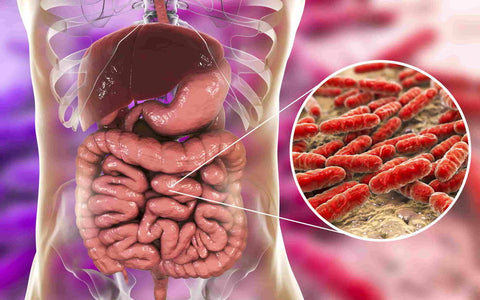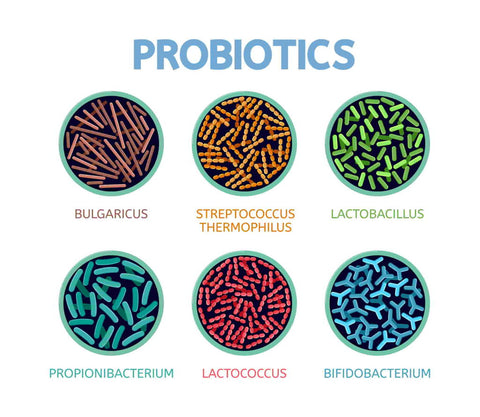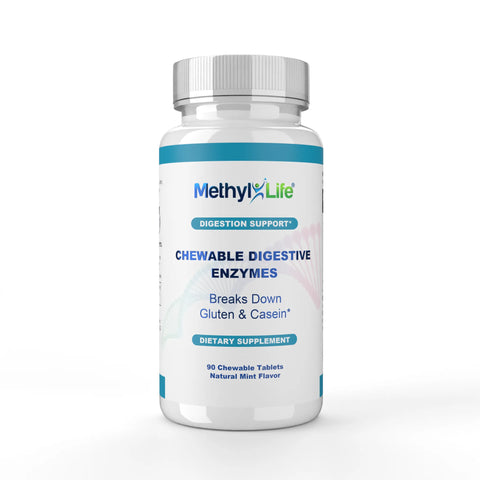
The Role of Enzymes, Probiotics, Prebiotics, and Postbiotics
Product Recommendations
Chewable Digestive Enzymes
$46.00
- Ease Your Belly from Post Meal Discomfort
- Assists Breakdown of Proteins, Carbohydrates, Lipids, Gluten & Dairy
- Tastes like a natural, after-dinner mint
- 3rd-Party Tested, Non-GMO, Gluten-Free, 90 Vegan Tablets

Written By:
Katie Stone - Naturopath
Medical Reviewer:
Dr. Nare Simonyan - PhD Pharmaceutical Science
Edited By:
Kari Asadorian - BSN, RNUpdated On:
June 14, 2025Digestive enzymes vs. probiotics
Digestive enzymes are proteins naturally produced by the body (mainly the pancreas) to break down carbohydrates, fats, and proteins. This process allows the food components to be easily absorbed into the bloodstream and used by the body.1
It’s worth noting that the pancreas becomes less efficient at producing gastric acid and digestive enzymes with age, which can affect digestion as you get older. This is when supplementing with digestive enzymes can be helpful.2
Probiotics are not enzymes and do not break down food as enzymes do. Probiotics are live bacteria that live in the intestines. Species such as Lactobacilli and Bifidobacteria ferment carbohydrates, which produce various beneficial compounds, including short-chain fatty acids (SCFAs) that provide fuel for cells and many other health benefits.3 SCFAs also help maintain the integrity of the gut barrier, and produce antimicrobial substances to ward off harmful bacteria.4
Digestive enzymes vs. prebiotics
While digestive enzymes break down food, prebiotics are fermented by certain strains of gut bacteria. This fermentation process produces beneficial compounds, such as short-chain fatty acids, that support gut health and many other bodily systems.5
Prebiotics vs. probiotics
Prebiotics are a non-digestible dietary fiber that acts as food for beneficial gut bacteria (probiotics). Think of prebiotics as the ‘fertilizer’ and probiotics as the seeds that ‘sow’ and generate the gut microbiome.
Prebiotics vs. postbiotics
Prebiotics are non-digestible fibers that act as food for beneficial bacteria in the gut. Postbiotics are the beneficial compounds produced when the probiotic bacteria break down (ferment) prebiotics.
The relationship between enzymes, probiotics, prebiotics and postbiotics and MTHFR
People with MTHFR genetic mutations may be affected by nutritional deficiencies, particularly in folate and B12. Chronic deficiency in these nutrients can lead to elevated homocysteine, which can then increase inflammation in the body.
Digestive enzymes, probiotics, and prebiotics can work together to optimize digestive function and nutritional absorption from food, which is critical for those with MTHFR.
Prebiotics and probiotics also contribute to the production of short-chain fatty acids (SCFAs), including acetate, propionate and butyrate. These SCFAs help protect the brain from neuroinflammation and are involved in several processes linked to depression, including poor blood flow to the brain, hormone imbalances, and changes in gene activity. Probiotic supplementation has been shown to help reduce the symptoms of mood disorders, including depression, schizophrenia, and anxiety, as well as behavioral disorders, ADHD and autism.6
These conditions are more prevalent in people with MTHFR mutations.
The Role of Enzymes, Probiotics, Prebiotics, and Postbiotics
Key takeaways
-
 Digestive enzymes break down food into components that can be absorbed and utilized
Digestive enzymes break down food into components that can be absorbed and utilized
-
 Prebiotics fuel or ‘feed probiotics’ (live microorganisms), which benefit the microbiome
Prebiotics fuel or ‘feed probiotics’ (live microorganisms), which benefit the microbiome
-
 Probiotics produce postbiotics which support digestion, immune function, and other bodily systems
Probiotics produce postbiotics which support digestion, immune function, and other bodily systems
-
 All of these can support digestion and overall good health
All of these can support digestion and overall good health



Product Recommendations
Chewable Digestive Enzymes
$46.00
- Ease Your Belly from Post Meal Discomfort
- Assists Breakdown of Proteins, Carbohydrates, Lipids, Gluten & Dairy
- Tastes like a natural, after-dinner mint
- 3rd-Party Tested, Non-GMO, Gluten-Free, 90 Vegan Tablets
Frequently Asked Questions about enzymes, probiotics, prebiotics and postbiotics
No. Digestive enzymes are proteins that break down food into absorbable components. Prebiotics are a type of fiber that is broken down (fermented) by gut bacteria (probiotics).
Your body needs both prebiotics and probiotics to function optimally. Prebiotics are present in many foods such as chicory, artichoke, lentils, and unripe bananas, so they can be included in the daily diet. Probiotics are best taken in supplement form as this ensures a direct dose of concentrated bacteria to the gut where it is needed.
Your gut needs fiber to support the movement of food through the digestive tract and to ‘feed’ beneficial bacteria. Prebiotics are a type of soluble fiber. Signs that you need prebiotics could include gas, bloating, constipation, diarrhea, and other gastrointestinal discomforts.
Prebiotics are considered safe for most people. However, they may cause gastrointestinal symptoms in those with bacterial imbalances such as dysbiosis and/or small intestine bacterial overgrowth (SIBO). People with FODMAP intolerance may also experience excess bloating, abdominal cramping, and constipation. If you are affected by these conditions, talk to your healthcare professional before taking prebiotics.
References
-
Gianluca Ianiro, Silvia Pecere, Valentina Giorgio, Antonio Gasbarrini, Giovanni Cammarota; "Digestive Enzyme Supplementation in Gastrointestinal Diseases"; Current drug metabolism; 2016 Feb
https://pmc.ncbi.nlm.nih.gov/articles/PMC4923703/
-
Didier Rémond, Danit R Shahar, Doreen Gille, Paula Pinto, Josefa Kachal, Marie-Agnès Peyron, Claudia Nunes Dos Santos, Barbara Walther, Alessandra Bordoni, Didier Dupont, Lidia Tomás-Cobos, Guy Vergères; "Understanding the gastrointestinal tract of the elderly to develop dietary solutions that prevent malnutrition"; Oncotarget; 2015 May
https://pmc.ncbi.nlm.nih.gov/articles/PMC4546438/
-
Mariarosaria Matera; "Bifidobacteria, Lactobacilli... when, how and why to use them"; Global Pediatrics; 2024 Jun
https://www.sciencedirect.com/science/article/pii/S2667009724000071
-
Yoonhwa Shin, Sunhee Han, Juhui Kwon Juhui Kwon, Songhyun Ju, Tae Gyu Choi, Insug Kang, Sung Soo Kim; "Roles of Short-Chain Fatty Acids in Inflammatory Bowel Disease"; Nutrients; 2023
https://www.mdpi.com/2072-6643/15/20/4466
-
Dorna Davani-Davari, Manica Negahdaripour, Iman Karimzadeh, Mostafa Seifan, Milad Mohkam, Seyed Jalil Masoumi, Aydin Berenjian, Younes Ghasemi; "Prebiotics: Definition, Types, Sources, Mechanisms, and Clinical Applications"; Foods; 2019 Mar
https://pmc.ncbi.nlm.nih.gov/articles/PMC6463098/
-
Hussein Sabit, Areej Kassab, Donia Alaa, Shaza Mohamed, Shaimaa Abdel-Ghany, Mohamed Mansy, Osama A Said, Mona A Khalifa, Halah Hafiz, Asmaa M Abushady; "The Effect of Probiotic Supplementation on the Gut–Brain Axis in Psychiatric Patients"; Current issues in molecular biology; 2023 May
https://pmc.ncbi.nlm.nih.gov/articles/PMC10217264/

About the Author
Katie is a qualified Naturopath (BNatMed) and freelance writer from New Zealand. She specializes in all things health and wellness, particularly dietary supplements and nutrition. Katie is also a dedicated runner and has completed more half-marathons than she can count!
Related Articles

Like what you read?
Please subscribe to get more content like this sent to your inbox.
Share This Article
Trusted by Experts. Backed by Science.
Trusted professionals crafting original content backed by verified research. Since 2012, Methyl-Life® has been dedicated to providing evidence-based education to help individuals better understand methylation and nutritional wellness.
-

Expert-authored education
Every article and guide is written or reviewed by professionals specializing in methylation science and nutritional biochemistry.
-

Research-verified information
Our content references peer-reviewed studies and verified data, ensuring accuracy, integrity, and real-world relevance.
-

Educational leadership since 2012
A founder-led team collaborating with clinicians, researchers, and health writers to make complex science accessible and actionable.
-

Transparent and trustworthy
All educational materials undergo internal review for scientific accuracy, compliance, and clarity before publication.







